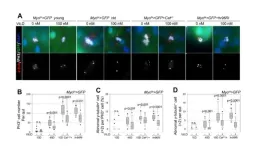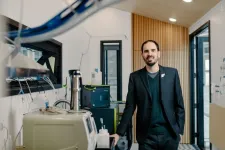(Press-News.org) Even as it's become clear that an inherited susceptibility to some cancers is more common than once thought, genetic testing of family members of cancer patients hasn't increased as much as experts had hoped. A new study led by researchers at Dana-Farber Cancer Institute and Brigham and Women’s Hospital demonstrates that a remote online genetic education program can be a powerful motivator for people with a family history of cancer to undertake genetic testing.
The GENetic Education, Risk Assessment, and TEsting (GENERATE) study included 601 people from across 45 states who had a close relative with the most common form of pancreatic cancer. Participants received genetic education through one of two remote online programs. After participating in one of the two genetic education interventions, 90% of the participants completed testing for inherited variations in more than a dozen genes linked to pancreatic cancer.
The impressive response to the remote genetic education programs was bolstered by participants' reactions to being tested. The 400 participants who completed a questionnaire on their experience indicated that testing did not spark anxiety, depression, or worries about cancer after receiving their genetic testing results.
"We know that 5 to 10 percent of all cancers are linked to inherited genetic variations. We know the specific variants linked to those cancers. And we know that cancer incidence and mortality can be reduced by identifying people who carry those variants and intervening to lower their cancer risk or closely monitor them to detect cancer at its earliest stages when it is most treatable," says study senior author Sapna Syngal, MD, MPH Co-Director of the Centers for Early Detection and Interception at Dana-Farber Cancer Institute and a faculty member at Brigham and Women's Hospital. "But we also know that not enough people who could benefit from genetic testing are being tested."
Among the potential barriers to testing are a limited public understanding of inherited cancer risk, lack of communication between an individual with cancer and family members who may be at risk for it, out-of-pocket costs, and a lack of nearby testing services and genetic counselors.
"We need new methods to make testing more available and increase awareness of its benefits," Syngal remarks. "The goal of this study was to assess how remote genetic education programs that people could access at home, online, might impact the decision to have genetic testing."
The study was open to people 18 years or older who had a first-degree relative with pancreatic ductal adenocarcinoma (PDAC) or a first- or second-degree relative with PDAC and an inherited variation in any of 13 genes linked to the disease. Participants were recruited through social media advertisements, pancreatic cancer advocacy organizations, and the six institutions collaborating on the GENERATE study.
The 601 participants, representing 424 families, were randomly assigned to one of two groups. One group participated in an interactive genetic education video session and viewed a seven-minute genetic education program narrated by a cancer physician. The other group had access only to an online genetic education program through a commercial laboratory website. Both groups had access to all materials in the online genetic education program available through the commercial laboratory website.
After completing the program, 541 participants, representing 90% of the entire study group, elected to undergo testing for inherited variations in PDAC-linked genes – opting to receive a saliva-based genetic testing kit shipped to their homes that they would then use to send a sample by mail to a testing center.
One of the most encouraging aspects of the study is the geographic range of the participants, researchers said. More than half of all those who enrolled in the study were not family members of patients at the six study sites, suggesting they heard about the study through social media or advocacy organizations.
"This demonstrates that online education is a real option for people who may not live near a genetic counseling center or testing facility," says the study's first author, Nicolette Juliana Rodriguez, MD, MPH, of Dana-Farber and Brigham and Women's Hospital.
All participants completed surveys of their psychological well-being – including feelings of anxiety, depression, and cancer worry – when they enrolled in the study, followed by questionnaires when they completed the program and three months later. Among the 400 who completed the questionnaires, the remote genetic education and testing programs had no impact on their anxiety, depression, or cancer worry.
"Our findings demonstrate that remote healthcare delivery methods have broad reach, are a successful and complementary option to traditional in-person models, and can increase the use of genetic testing," Rodriguez remarks. "It's critical that we continue to develop strategies of care delivery for historically marginalized racial and ethnic communities to ensure they have equal access to cancer genetics services."
The study was supported by a Stand Up To Cancer-Lustgarten Foundation Pancreatic Cancer Interception Translational Cancer Research Grant (grant SU2C-AACR-DT25-17) and by the Mayo Clinic SPORE in Pancreatic Cancer (grant P50CA102701); the Khalifa Bin Zayed Foundation; the Bowen-Chapman Family Research Fund; the Pancreatic Cancer Action Network Catalyst Award; and the National Institutes of Health (grants T32 DK007533-35, CA210170, and P50CA062924). The work was also conducted with support from a K12TR004381 award through Harvard Catalyst | The Harvard Clinical and Translational Science. The content is solely the responsibility of the authors and does not necessarily represent the official views of Harvard Catalyst, Harvard University and its affiliated academic healthcare centers, or the National Institutes of Health.
END
Remote online genetic education programs can spur testing for inherited susceptibility to cancer, study suggests
2024-02-27
ELSE PRESS RELEASES FROM THIS DATE:
Study shows daylight saving time has minimal effect on heart health
2024-02-27
ROCHESTER, Minn. — A recent Mayo Clinic study examining the effects of daylight saving time (DST) on heart health suggests that the impact is likely minimal.
In the nationwide study, researchers applied an advanced statistical model to look for any connections between DST and serious cardiovascular problems, including heart attacks and strokes. The study looked at 36,116,951 adults aged 18 and up across most U.S. states. (Arizona and Hawaii were excluded since these states do not observe DST.)
Researchers focused on the week directly after the spring and fall DST transition, ...
New disease testing component facilitates lower-cost diagnostics
2024-02-27
A new tool could reduce costs for diagnosing infectious diseases.
Biomedical researchers from The University of Texas at Austin have developed a new, less expensive way to detect nuclease digestion – one of the critical steps in many nucleic acid sensing applications, such as those used to identify COVID-19 and other infectious diseases.
A new study published in the journal Nature Nanotechnology shows that this low-cost tool, called Subak, is effective at telling when nucleic acid cleavage occurs, which happens when an enzyme called nuclease breaks down nucleic acids, such as DNA or RNA, into smaller fragments.
The traditional way of identifying nuclease ...
White House includes two Tufts-related initiatives in commitments to end hunger, reduce diet-related disease
2024-02-27
Two Tufts-related initiatives have been included in the White House’s new round of public and private sector commitments, announced today by the Biden-Harris administration, to end hunger, improve nutrition, and reduce diet-related disease in the United States by 2030. The White House Challenge to End Hunger and Build Healthy Communities continues the Biden-Harris administration’s work started at the historic White House Conference on Hunger, Nutrition, and Health that was held in September 2022, encouraging stakeholders from all corners to develop bold commitments to help achieve the administration’s five key pillars of national ...
U of M-led research identifies predictor of outcomes, chemoresistance for ovarian cancer patients
2024-02-27
MINNEAPOLIS/ST. PAUL (2/27/2024) — In a major scientific breakthrough, newly published research from an international consortium led by the University of Minnesota’s Masonic Cancer Center has the potential to transform the landscape of ovarian cancer treatment.
Published today in JAMA Network Open, the findings indicate that ovarian cancer patients with high levels of stroma within their tumors are twice as likely to exhibit chemoresistance to the conventional standard of care. Stroma is the non-cancerous tissue that provides support to tumors.
The ...
NRG Oncology announces new leadership of Canadian Members Subcommittee
2024-02-27
NRG Oncology, a National Cancer Institute (NCI) National Clinical Trials Network (NCTN) group focused on improving outcomes for adults with cancer through multi-center clinical research, recently announced a new Chair and Vice Chair of the organization’s Canadian Members Subcommittee.
The NRG Canadian Members Subcommittee is tasked with engaging and supporting NRG’s Canadian member institutions through their participation in NRG research. This subcommittee was created to tackle the unique regulatory, administrative, and ...
Bariatric surgery provides long-term blood glucose control, type 2 diabetes remission
2024-02-27
BATON ROUGE – People with type 2 diabetes who underwent bariatric surgery achieved much better long-term blood glucose control compared to people who received medical management plus lifestyle interventions, according to a new study published in JAMA, or Journal of the American Medical Association, and funded by the National institute of Diabetes, Digestive and Kidney Diseases, part of The National Institutes of Health.
In addition, participants who underwent bariatric surgery, also called metabolic or weight-loss surgery, were more likely to stop needing diabetes medications and had higher rates of diabetes remission up to 12 years post-surgery. ...
The anti-aging effect of vitamin D and vitamin D receptor in Drosophila midgut
2024-02-27
“Our study demonstrated that the VitD/VDR [vitamin D/vitamin D receptor] pathway is required for intestinal homeostasis during normal differentiation and aging.”
BUFFALO, NY- February 27, 2024 – A new research paper was published in Aging (listed by MEDLINE/PubMed as "Aging (Albany NY)" and "Aging-US" by Web of Science) Volume 16, Issue 3, entitled, “The anti-aging effect of vitamin D and vitamin D receptor in Drosophila midgut.”
Adult stem cells are pivotal for maintaining tissue homeostasis, and their functional ...
You may be breathing in more tiny nanoparticles from your gas stove than from car exhaust
2024-02-27
WEST LAFAYETTE, Ind. — Cooking on your gas stove can emit more nano-sized particles into the air than vehicles that run on gas or diesel, possibly increasing your risk of developing asthma or other respiratory illnesses, a new Purdue University study has found.
“Combustion remains a source of air pollution across the world, both indoors and outdoors. We found that cooking on your gas stove produces large amounts of small nanoparticles that get into your respiratory system and deposit efficiently,” said Brandon Boor, an associate professor in Purdue’s Lyles School of Civil Engineering, who led this research.
Based on these ...
NREL-led workshop points to path for clean energy future
2024-02-27
Participants in a workshop organized by the U.S. Department of Energy’s National Renewable Energy Laboratory (NREL) agree on the importance of mitigating degradation rates for the continuing rollout of clean technologies.
Renewable energy is forecast to play an expanded role in meeting future needs, with terawatts of electricity expected to be generated from wind and solar, so the performance of the technologies involved is becoming increasingly important. Any technology degrades over time, so researchers are looking at ways to curb this issue. Mitigating degradation will become a factor ...
Teens benefit from "forest bathing" – even in cities
2024-02-27
Youth mental health in urban environments is significantly better when more nature is incorporated into city design.
A new study from University of Waterloo researchers suggests that forest bathing, the simple method of being calm and quiet amongst the trees, observing nature around you while breathing deeply, can help youth de-stress and boost health and well-being.
The study was the first ever to collect on-site, real-time survey data from adolescents about their emotional responses to various urban environments like a transit hub, residential ...



